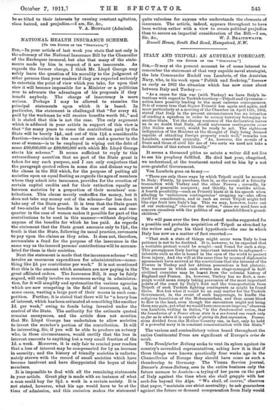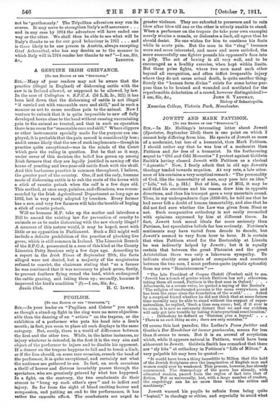ITALY AND TRIPOLI: AN AUSTRIAN FORECAST. [To ma Enrros or
rim " Si.zcrwToE."]
Sra,—It may at the present moment be of some interest to remember the statement of that very capable naval strategist, the late Commander Rudolf von Lambres, of the Austrian Navy, who, in his work upon " Politik and Seekrieg," foresaw as early as 1902 the situation which has now come about between Italy and Turkey:— "As a cause for this war (with Turkey) we have Italy's in- tentions with regard to Turkish territory—Tripoli and Cyronaica- action here possibly leading to the most extreme consequences. It is of course true that Signor Prinetti has again and again, and more particularly at a meeting of the Chamber on April 15th, 1902, stated that Italy in the present circumstances has no intention of sending a squadron in order to occupy territory belonging to another State. Yet the closing sentence of the declaration leaves us in no doubt that Italy, should unforeseen contingencies occur (the italics are ours), would be ready to act. Tho righteous indignation of the Minister at the thought of Italy being deemed capable of attacking foreign property reads well," remarks von Lambres, somewhat cynically. " As, however, the morals of a State and those of civil life are of two sorts we need not take a declaration of this nature literally."
It seems a thousand pities so astute a writer did not live to see his prophecy fulfilled. He died last year, chagrined, we understand, at the treatment meted out to him by a not over-grateful Government.
Von Lambres goes on to say :—
" There are only three ways by which Tripoli could be secured to Italy: Firstly, by purchase, that is, as the result of a friendly transaction with Turkey and the other Powers ; secondly, by means of peaceable conquest; and thirdly, by warlike action. A fourth possibility—such as Prinetti hints at in his speech when alluding to `unforeseen contingencies' cropping up—also offers itself for consideration, and in such an event Tripoli might fall like ripe fruit into Italy's lap. This we may, however, leave out of our reckoning," observes the writer, " since wo need here not concern ourselves with the politics of our grandchildren's grand- children."
We will pass over the two first-named modes suggested fot a possible and probable acquisition of Tripoli as skeulbed by the writer and give his third hypothesis—the one to which Italy has now as a matter of fact resorted :-- " That such a state of things might occur were Italy to lose patience is not to be doubted. It is, however, to be expected that a veritable pretext would be sought—and found for such a step. This presupposes Italy having important interests to safeguard— interests such as she is bound in the eyes of the world to protect from injury. And she will at the same time by means of diplomatic agreements have arrived at the convictions that the interest of the Powers in Turkey and her African possessions is but platonic. The manner in which such events are stage-managed in half- civilized countries may be learnt from the colonial history of England and France. As, however, Turkey has no fleet, a cam- paign would mean simply taking possession of the most important points of the coast by Italy's fleet and the transportation from Tripoli of such Turkish fighting contingents as might be found there. Not but what it would be an easy matter for the Turkish Government, in the event of such happenings, to kindle the religious fanaticism of the Mohammedans, and thus cause blood to flow in the land, even though the encounters might not bring them any gain; yet what we would here once more impress," observes von Lambres, writing in italics, "is the fundamental axiom, that the boundaries of a Power whose state is a sea-bound one reach only as far as to where it is capable of giving its fleet expression. Posses- sions divided from the Mother Country can, in fact, only be held if a powerful navy is in constant communication with the State."
The various and contradictory voices heard throughout the entire Continental Press are significant of Europe's crise de nod's.
The Frankfurter Zeitung seeks to vent its spleen against its country's accredited representatives, asking how it is that if these things were known practically four weeks ago in the Chancelleries of Europe they should have come as such a thunderclap to Germany. The Vienna Service journal, Danzer's .Armes-Zeitung, sees in the entire business only the future menace to Austria—a trying of her pacers on the part of Italy against the time when she shall grapple with her arch-foe beyond the Alps. " We shall, of course," observes that paper, " maintain our strict neutrality; to ask guarantees against the future or demand compensation from Italy would not be 'gentlemanly.' The Tripelitan adventure may run its course. It may serve to strengthen Italy's self-assurance . . and in any case by 1914 the adventure will have ended one way or the other. We shall then be able to see what will be Italy's thanks to us for our good behaviour in 1911 . . . and is there likely to be one person in Austria, always excepting Graf Aehrenthal, who has any doubts as to the manner in which Italy will in 1914 render her thanks to us ? "—I am, Sir,































































 Previous page
Previous page